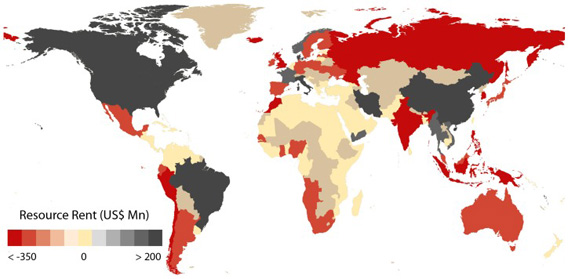
Indonesian fishermen load sardines into the back of a truck. Photo by Rhett Butler.
Global fisheries are gutting the world economy by US$13 billion annually, according to an economic analysis published July 13 in the journal PLoS ONE. National subsidies that encourage overfishing cause the most losses, the analysis claims. However, researchers believe that allowing fish stocks to rebuild and making fishing more efficient could reverse these losses, leading to net gains of US$600 to US$1,400 billion within 50 years.
Such savings won’t come cheaply, the analysis suggests. Rebuilding fisheries worldwide could cost US$130 to US$292 billion, the researchers estimate. Most of the cost would go toward retraining or retiring nearly half of the world’s 35 million fisheries workers.
Overfishing is a global problem exacerbated by subsidies, said lead author Rashid Sumaila, director of the fisheries center at the University of British Columbia, in an interview with mongabay.com.
Providing subsidies means that more people are fishing than can naturally be sustained by the supply of fish. The result is fishermen harvesting more fish before they grow to their full potential size. Government subsidies, such as paying for fishermen’s boat fuel, come to US$19 billion worldwide annually, according to the team’s analysis.
Rebuilding fisheries—that is, temporarily stopping fishing to allow fish to reach full size—could take eight to ten years, said Sumaila. When fishing resumes, fewer fish would need to be caught, because each would weigh more. This would save resources, such as fuel and labor.
“If you’re asking whether a fishery can rebuild within ten years, the answer is yes, but it depends on where it is and what the species is,” said Rod Fujita, an official with the Environmental Defense Fund who was not part of the study, in an interview with mongabay.com. Some species, such as snapper and lobster, can rebound quickly because they produce many offspring, mature early and live in warm water, said Fujita. Other species, such as rockfish, could take decades to recover.
According to the analysis led by Sumaila, savings will start to outweigh the initial costs 12 years after rebuilding begins. However, the team’s model does not account for the cost of preventing illegal fishing in designated rebuilding areas. Those expenses would significantly reduce the estimated benefits of rebuilding, said co-author Daniel Pauly, professor of fisheries at the University of British Columbia, in an interview with mongabay.com.

Figure 1 resource rent map. Fisheries performance by country, indicated by resource rent—what’s left over after subtracting subsidies and fishing costs from fishing revenue. Countries in red incur the most losses. Currently, total global fisheries losses add up to US$13 billion annually, a new paper estimates. Credit: Sumaila et al., PLoS ONE.
Critically, the team’s economic model assumes that 15 to 22 million fishermen can be removed from the workforce within one to two years, said Sumaila.
“This is the real difficulty in solving the fishery problem,” said Sumaila. “Especially in developing countries, education levels are not high and skill levels are low, so you have problems with their ability to move [fishermen] to other sectors.”
“Some fishermen really want to remain on the water,” added Sumaila. Many countries have responded by creating programs to retrain fishermen in environmental tourism or cleaning the ocean. Sumaila cites the European Union’s ‘Fishing for Plastic’ program as a promising example.

Fishing boats off the coast of Indonesia. Along with Russia, Chile and India, Indonesia is among the loss leaders in the global fishing market. Photo by Rhett Butler.
Still, Fujita is skeptical. “Although people talk in a kind of cavalier way that we could take millions of fishermen and retrain them,” he said, “it’s difficult for me to envision how we’re going to do it.”
The most direct route to economic gains is through proper management of catch limits and fishing for value, Fujita added, rather than volume.
CITATION: Sumaila UR, Cheung W, Dyck A, Gueye K, Huang L, Lam V, Pauly D, Srinivasan T, Swartz W, Watson R, Zeller D (2012) Benefits of rebuilding global marine fisheries outweigh costs. PLoS ONE 7(7). doi:10.1371/journal.pone.0040542.
Chris Palmer is a graduate student in the Science Communication Program at the University of California, Santa Cruz.
Related articles







